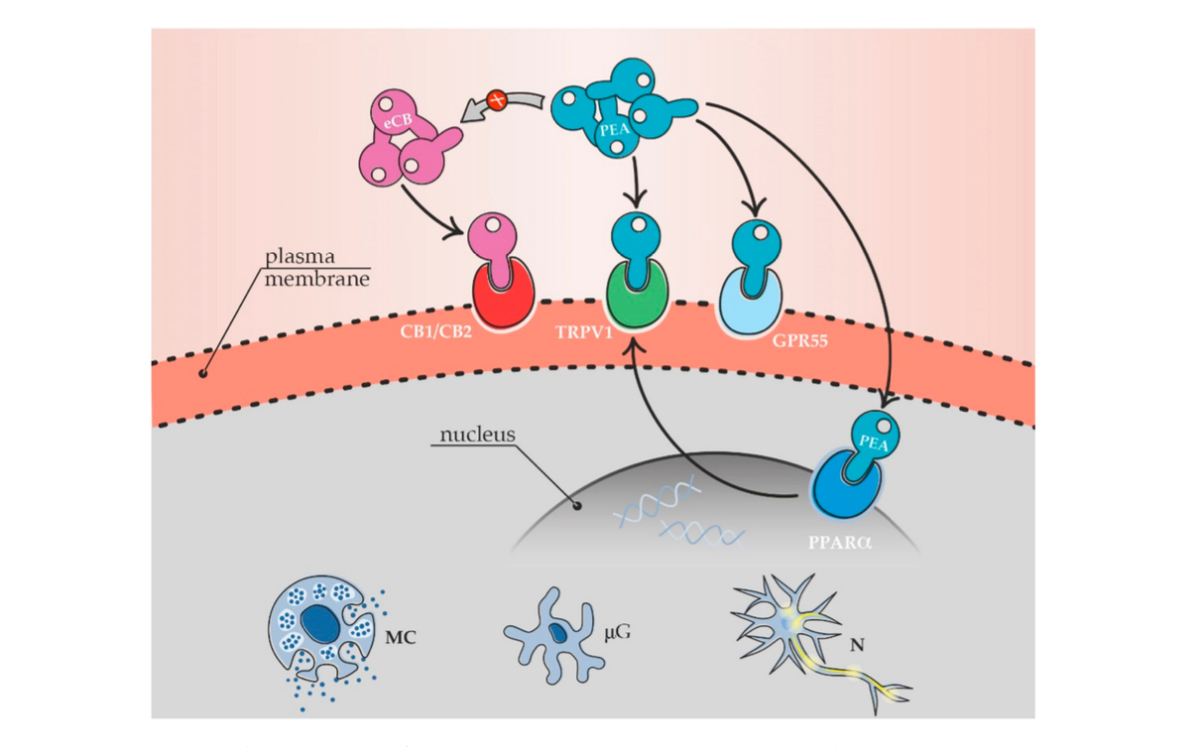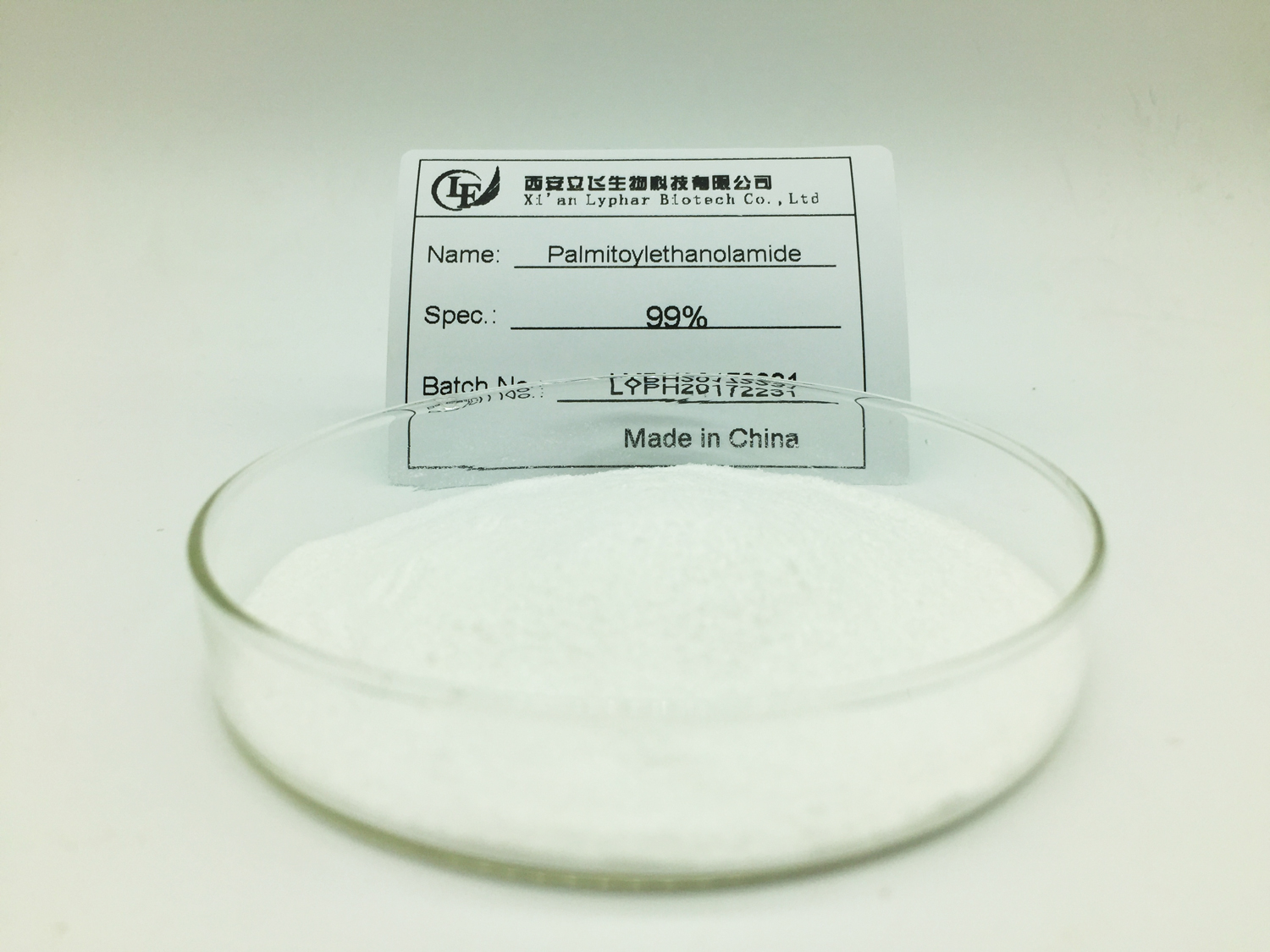Palmitoylethanolamide (PEA) is a naturally occurring fatty acid amide that belongs to the class of compounds known as endocannabinoids. It is derived from palmitic acid, a common saturated fatty acid, and ethanolamine. PEA has attracted interest for its potential therapeutic effects, particularly in areas of pain management, inflammation, and neuroprotection. Here’s a detailed overview:
Chemical Structure of Palmitoylethanolamide
- IUPAC Name: N-(2-hydroxyethyl)hexadecanamide
- Molecular Formula: C18H37NO2
- Molecular Weight: 297.5 g/mol
- It is a fatty acid amide composed of a palmitic acid chain (C16) and an ethanolamine group.

Mechanism of Action
Palmitoylethanolamide (PEA) works through several pathways:
- CB2 Receptor Interaction: Palmitoylethanolamide does not bind directly to the CB1 and CB2 receptors, but it can modulate them indirectly, particularly the CB2 receptors. It enhances the effects of the endocannabinoid anandamide by inhibiting the enzyme fatty acid amide hydrolase (FAAH), which is responsible for breaking down anandamide.
- PPAR-α (Peroxisome Proliferator-Activated Receptor-alpha): Palmitoylethanolamide activates PPAR-α, a nuclear receptor involved in regulating inflammation and pain. This activation is thought to contribute to Palmitoylethanolamide’s anti-inflammatory and analgesic effects.
- Mast Cell Stabilization: Palmitoylethanolamide has been shown to stabilize mast cells, which are involved in inflammatory responses, preventing the release of inflammatory mediators such as histamine.
- Neuroprotective Effects: Palmitoylethanolamide has neuroprotective properties, particularly in the context of neuroinflammation and neurodegenerative conditions.
Potential Benefits of Palmitoylethanolamide
- Pain Relief: Palmitoylethanolamide has been found to be effective in reducing various types of pain, including neuropathic pain, chronic pain, and inflammatory pain. It is often considered a non-psychoactive alternative to traditional analgesics.
- Anti-inflammatory Effects: Palmitoylethanolamide has demonstrated the ability to reduce inflammation in various conditions, such as arthritis, fibromyalgia, and inflammatory bowel disease.
- Neuroprotective: There is evidence suggesting that Palmitoylethanolamide may protect against neurodegeneration in diseases like Parkinson’s and Alzheimer’s by reducing neuroinflammation.
- Mood and Anxiety Regulation: Although less well-established, Palmitoylethanolamide may also have potential benefits for mood disorders and anxiety, likely through its influence on endocannabinoid signaling and neuroinflammatory pathways.
- Skin Health: Topical use of Palmitoylethanolamide has been explored in conditions like eczema and psoriasis due to its anti-inflammatory and skin barrier-supporting effects.

Sources of Palmitoylethanolamide
Palmitoylethanolamide (PEA) is naturally present in small amounts in various foods, including:
- Egg yolk
- Soybeans
- Peanuts
- Almonds
Therapeutic Use Palmitoylethanolamide
Palmitoylethanolamide (PEA) is available as a supplement and has been investigated for a variety of therapeutic applications:
- Chronic pain management (e.g., diabetic neuropathy, post-surgical pain)
- Inflammatory conditions (e.g., arthritis, fibromyalgia)
- Neurological disorders (e.g., multiple sclerosis, Parkinson’s disease)
It is commonly used as an adjunct to traditional treatments, especially in cases where other therapies have limited effectiveness or cause undesirable side effects.
Side Effects and Safety
- Generally well-tolerated: Palmitoylethanolamide is considered safe with few reported side effects. It is not known to cause significant adverse effects or interact negatively with most medications.
- Dosage: The typical dosage range for Palmitoylethanolamide in clinical studies is around 300 mg to 1200 mg per day, often in divided doses.

Research and Clinical Studies
While the research on Palmitoylethanolamide is therapeutic benefits is promising, more large-scale, high-quality clinical trials are needed to confirm its efficacy and safety for various conditions.
In summary, Palmitoylethanolamide is a promising natural compound with anti-inflammatory, analgesic, and neuroprotective properties, offering potential benefits in pain management, inflammation, and various neurological conditions. However, further studies are needed to fully understand its long-term effects and broader therapeutic potential.
